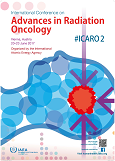Speakers
Lotfi KOCHBATI
Semia ZARRAA
Description
**Background** :
Regular assessments in radiation therapy facilities are mandatory to meet demands and much safety
standards. There is no comprehensive statistical analysis in the radiation therapy department of Saleh
Azeiez Institute (SAI).
The aim of this study was to assess the workload of the SAI’s radiotherapy department with a
description of technical features in treatments and epidemiologic characteristics of treated patients.
Methods :
We performed a retrospective survey in patients recorded in SAI since January the 1st 2012 to
December 31th 2012 who received radiotherapy in SAI during 2012 and after until June the 1st 2014.
We analyzed pathologies, age, gender, treatment intent, dose, attendances, fractions, treatment
machines and treatment techniques.
Results :
There were 1548 patients treated. The total number of treatment courses was 1675 with 1451(88%)
courses of external beam radiation therapy (EBRT) and 206 (12%) courses of brachytherapy.
There were 1364 (88%) patients treated with EBRT among them the reirradiation rate was (6,3%).
A total number of 27801 attendances was delivered. Total Fractions number was 30232. The mean of
each megavoltage machine throughput was 445 patients, 475 treatment and 9745 fractions.
The most frequent pathologies were breast cancer (36%), head and neck cancer (17%) and lung
cancer (10,9%). The mean age of patients was 53 years. Females proportion was 57% and male
proportion was 43%. Treatment intent was curative in 74% of cases and palliative in 26% of cases.
The EBRT technique was 2D in 91% of cases and 3D in 9% (technique started in 2011).
Conclusion :
Practices in SAI’s radiation therapy department met international standards with regard to workload
with an ongoing process of implementing new techniques.
| Institution | Salah Azaiz Institute, faculty of medecine of Tunis |
|---|---|
| Country | Tunisia |
Author
Lotfi KOCHBATI
Co-author
Semia ZARRAA

